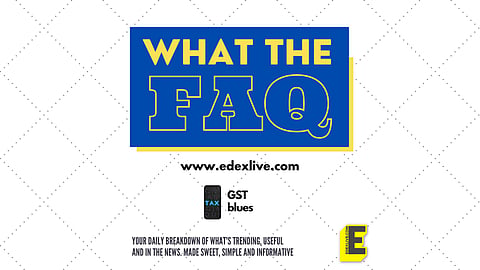

The 47th GST Council meeting is on, and there are some new changes on the plate…well, literally. The all-powerful Council has decided to bring some food items, which were not being taxed till now, under the GST net. Also, if you are fond of online gaming and horse racing, then be careful buddy. They will be taxed too. And oh, if you are planning to book a hotel, you should check the GST rates on the tariffs for sure, as GST is being set on those as well.
A lot to take in? Yeah, we agree, but it’s all coming anyway. So, better be prepared when these new GST recommendations are actually implemented. Don’t worry. We’re breaking it down for you.
What are the food items which will attract GST?
1) Pre-packet and labelled meat and fish (except frozen)
2) Packaged lassi and buttermilk
3) Packaged curd and paneer
4) Honey
5) Dried leguminous vegetables
6) Dried makhana
7) Wheat, rice and other cereals
8) Wheat or meslin flour
9) Jaggery
10) Puffed rice
11) Papad
12) Other unbranded food grains and food items
Currently, these items were exempt from the GST net, but would now be included under the 5% slab.
Why was this done?
Branded food items attracted a 5% rate, but the non-branded ones did not. The exemption withdrawal was the recommendation of the State Finance Ministers and the Fitment Committee (GST Council's fitment committee comprises revenue officials from both Centre and states), headed by Karnataka Chief Minister Basavaraj Bommai at the GST Council meeting. The move was to bring non-branded but ‘pre-packaged, labelled’ agri-products under the 5% slab, on par with their branded counterparts, in order to bring uniformity to the tax structure. The fact is many firms sell packaged dairy and agri-products without registering their brand to avoid tax.
The Council’s recommendations have been accepted. So, these and many other items will become costlier once the Union Finance Ministry issues a notification to implement the GST Council’s decision.
For what else will the taxes go up?
Hotel rooms with a tariff below Rs 1,000 per night and hospital rooms with a daily tariff of over Rs 5,000 are to become taxable under the 12% GST slab. Further, the GST Council had introduced a uniform rate of 28% on all activities related to online games, casinos and horse racing, including the contest entry fee paid by the player. Maps, charts and atlases will attract a 12% levy.
The panel has recommended raising the GST rate from 12% to 18% (correction of inverted duty structure) on items like printing, writing and drawing ink, certain knives, blades, spoons and tableware, dairy machinery, edible oil, LED lamps and drawing instruments. An increase in the rate from 5% to 12% is also likely for solar water heaters and finished leather products.
GST exemption is being withdrawn for bank cheques, both loose and in book form, which will now attract an 18% rate. And the Council has suggested phasing out the tax exemption on services provided by the Reserve Bank of India (RBI) and the Securities and Exchange Board of India (Sebi).
What continues to be exempted?
Daily-use items, services and utilities would be exempted from the GST, just as they are.
1) Bread
2) Hearing aids
3) Educational institutions
4) Incense sticks
5) Utensils
6) Tractors
7) Agri-related machinery
What are the other changes on the way?
To make their transportation more transparent, Kerala Finance Minister recommended that states should now be free to specify a threshold for mandatory e-way bill generation for the movement of gold and precious stones, and this has been accepted by the Council. The Council also discussed extending the term of the National Anti-Profiteering Authority (NAA) beyond November this year, as most states agreed that its role is crucial. Maharashtra Finance Minister Ajit Pawar suggested stricter scrutiny and verification of high-risk taxpayers and mandatory presentation of electricity bills at the time of registration. Public disclosure of information about unregistered bogus traders and certification of taxpayers' bank accounts by the National Payments Corporation of India (NPCI) was also recommended by him and accepted by the Council.
Finally, deliberations to either extend the GST compensation by five years for non-BJP-ruled states like Chhattisgarh or to increase the rate for them from 50% to 70-80% were made. The discussion will be taken up again today, on June 29 by Finance Minister Sitharaman. The Council has also considered setting up GST tribunals and has asked the Group of Ministers (GoMs) to draw up a report on a detailed structure for them. The FM is scheduled to brief the media on the outcomes of the 47th GST Council meeting at 4 pm today.
